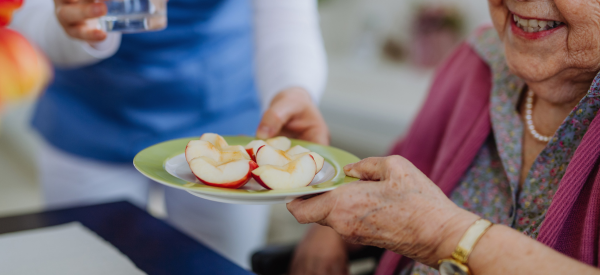
But there is great news: doctors confirm that eating the right foods every day can reduce your risk of developing cardiovascular disease. Fresh produce is the cornerstone for a heart healthy diet because it helps wipe out free radicals in the bloodstream, protecting blood vessels. The foods listed here are all top-performers in protecting your heart and blood vessels.
On November 18th, at 7:00 pm, Freedom Home Care’s Wellness Center at the Lodge of Northbrook will host Dr. Jason Robin, Cardiologist at NorthShore University HealthSystems. Dr Robin will speak about the benefits of a Mediterranean diet, and how it helps promote good heart health habits. The lecture is free to attend, and is presented by Brandel Health & Rehab in Northbrook. To learn more, call the Lodge of Northbrook at (847) 897-2821.
Here are the top 25 Heart-Healthy foods, plus some great menu ideas — so you can easily bring them into your daily breakfast, lunch, and dinner.
- Salmon: Omega-3 fatty acids. Grill salmon with a yummy rub or marinade. Save a chunk to chop for a pasta or salad later on.
- Flaxseed (ground): Omega-3 fatty acids; fiber, phytoestrogens. Ground flaxseed hides easily in all sorts of foods — yogurt parfaits, morning cereal, homemade muffins, or cookies.
- Oatmeal: Omega-3 fatty acids; magnesium; potassium; folate; niacin; calcium; soluble fiber. Top hot oatmeal with fresh berries. Oatmeal-and-raisin cookies are a hearty treat.
- Black or Kidney Beans: B-complex vitamins; niacin; folate; magnesium; omega-3 fatty acids; calcium; soluble fiber. Give soup or salad a nutrient boost — stir in some beans.
- Almonds: Plant omega-3 fatty acids; vitamin E; magnesium; fiber; heart-favorable mono- and polyunsaturated fats; phytosterols. Mix a few almonds (and berries) into low-fat yogurt, trail mix, or fruit salads.
- Walnuts: Plant omega-3 fatty acids; vitamin E; magnesium; folate; fiber; heart-favorable mono- and polyunsaturated fats; phytosterols. Walnuts add flavorful crunch to salads, pastas, cookies, muffins, even pancakes.
- Red wine: Catechins and reservatrol (flavonoids). Toast your good health! A glass of red wine could improve “good” HDL cholesterol.
- Tuna: Omega-3 fatty acids; folate; niacin. Here’s lunch: Salad greens, fresh fruit, canned tuna. Keep “Salad Spritzer” – a light dressing — in your office fridge.
- Tofu: Niacin; folate; calcium; magnesium; potassium. Tasty tofu is easy: Thinly slice “firm” tofu, marinate several hours, grill or stir-fry.
- Brown rice: B-complex vitamins; fiber; niacin; magnesium, fiber. Microwavable brown rice makes a quick lunch. Stir in a few chopped veggies (broccoli, carrots, spinach).
- Soy milk: Isoflavones (a flavonoid); B-complex vitamins; niacin; folate, calcium; magnesium; potassium; phytoestrogens. Soy milk is great over oatmeal or whole-grain cereal. Or, make a smoothie with soy milk.
- Blueberries: Beta-carotene and lutein (carotenoids); anthocyanin (a flavonoid); ellagic acid (a polyphenol); vitamin C; folate; calcium, magnesium; potassium; fiber. Cranberries, strawberries, raspberries are potent, too — for trail mixes, muffins, salads!
- Carrots: Alpha-carotene (a carotenoid); fiber. Baby carrots are sweet for lunch. Sneak shredded carrots into spaghetti sauce or muffin batter.
- Spinach: Lutein (a carotenoid); B-complex vitamins; folate; magnesium; potassium; calcium; fiber. Pick spinach (not lettuce) for nutrient-packed salads and sandwiches.
- Broccoli: Beta-carotene (a carotenoid); Vitamins C and E; potassium; folate; calcium; fiber. Chop fresh broccoli into store-bought soup. For a veggie dip, try hummus (chickpeas).
- Sweet potato: Beta-carotene (a carotenoid); vitamins A, C, E; fiber. Microwave in a zip-lock baggie for lunch. Eat au naturale, or with pineapple bits.
- Red bell peppers: Beta-carotene and lutein (carotenoids); B-complex vitamins; folate; potassium; fiber. Rub with olive oil, and grill or oven-roast until tender. Delicious in wraps, salads, sandwiches.
- Asparagus: Beta-carotene and lutein (carotenoids); B-complex vitamins; folate; fiber. Grill or steam slightly, then dress with olive oil and lemon. It’s a pretty side dish.
- Oranges: Beta-cryptoxanthin, beta- and alpha-carotene, lutein (carotenoids) and flavones (flavonoids); vitamin C; potassium; folate; fiber. Got orange juice? Check out the new nutrient-packed blends.
- Tomatoes: Beta- and alpha-carotene, lycopene, lutein (carotenoids); vitamin C; potassium; folate; fiber. For a flavor twist, try oil-packed tomatoes in sandwiches, salads, pastas, pizzas.
- Acorn squash: Beta-carotene and lutein (carotenoids); B-complex and C vitamins; folate; calcium; magnesium; potassium; fiber. Baked squash is comfort food on a chilly day. Serve with sautéed spinach, pine nuts, raisins.
- Cantaloupe: Alpha- and beta-carotene and lutein (carotenoids); B-complex and C vitamins; folate; potassium; fiber. A fragrant ripe cantaloupe is perfect for breakfast, lunch, potluck dinners.
- Papaya: Beta-carotene, beta-cryptoxanthin, lutein (carotenoids); Vitamins C and E; folate; calcium; magnesium; potassium. Serve papaya salsa with salmon: Mix papaya, pineapple, scallions, garlic, fresh lime juice, salt and black pepper.
- Dark chocolate: Reservatrol and cocoa phenols (flavonoids). A truffle a day lowers blood pressure, but choose 70% or higher cocoa content.
- Tea: Catechins and flavonols (flavonoids). Make sun tea: Combine a clear glass jar, several tea bags, and hours of sunshine.
Want some more guidance or assistance with cooking and meal planning to make the switch to a Heart Healthy Diet today? Freedom Home Care offers extensive in home care, with no hourly minimum to begin. To learn more about our services, visit : www.freedomhomecare.net/services



